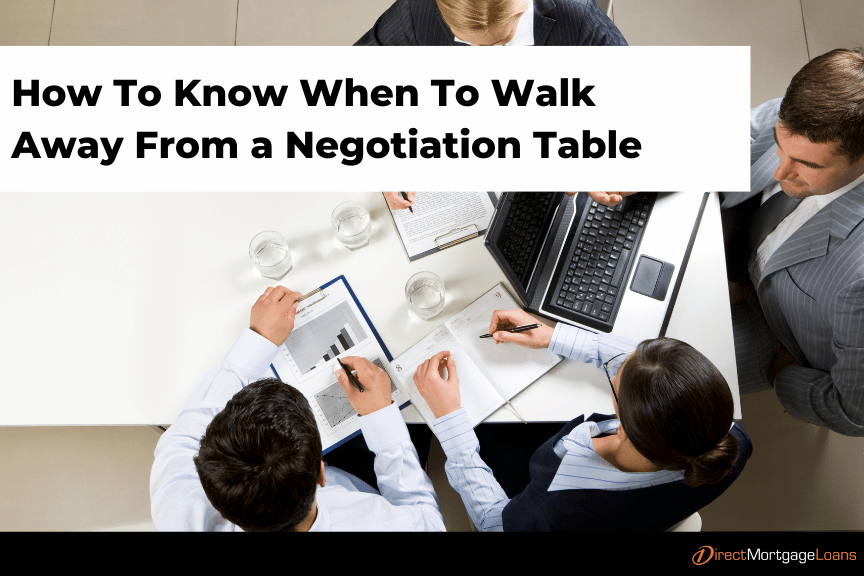You are looking to buy a new home for your family, but you must sell your current one first. Your buyers are getting a bit difficult and stressful to work with. You need to know when it is in your best interest to walk away from the deal.
Here is how to know when it is best for you to walk away from the negotiation table during the home selling or home buying process. Contact a team member today to get pre-approved if you are ready to buy a new home!
How do you know when to walk away from a house negotiation as a seller?
When should a seller walk away from a house negotiation?
When should I compromise with the home buyer?
How do you handle difficult home buyers?
Why would a seller not counteroffer?
How do you know when to walk away from a house negotiation as a buyer?
When should a buyer walk away from a house negotiation?
How do you know when to walk away from a house negotiation as a seller?
Negotiation is about mutual gain and compromise. When you are selling your home, you want to assure you are happy and content with the buyer’s final offer. A compromise is fine but if the buyers are becoming too frustrating and complex, it is best to discuss your concerns with your real estate agent. Your agent will be able to give expert advice on whether to scrap the deal or if the buyers are worth working with further.
When should a seller walk away from a house negotiation?
There are a few red flags that indicate it is most likely in your best interest to walk away from a home purchase.
First Red Flag: Issues Found In The Home Inspection
Concessions, in real estate, are something granted from the seller to the buyer in the home sale. If the buyer begins asking for concessions such as repairs under $100, landscaping, cosmetic imperfections, or any small nit-picky requests, it could be best to walk away. You should be responsible for the repairs that the home inspection finds dangerous.
Second Red Flag: The buyer continuously lowballs their offer.
If you discuss the market with your agent and they inform you that the buyer’s offers are way too low, it may be best to look at other options. Compromise is different than closing a bad deal.
Third Red Flag: The buyer does not have proof of funds prior to submitting an offer.
Essentially, you should walk away if the buyer is not proven eligible to purchase the home. It is best if they are pre-approved before putting in an offer. When reviewing the offer, ensure a pre-approval letter is submitted with the documentation.
When should I compromise with the home buyer?
Buying a home and selling a home are both big investments. You will have to be open to compromise and negotiation with a buyer to come to an offer that benefits you both. You should both get a sense of mutual gain. To navigate this and assure you are not being taken advantage of, work openly with your real estate agent. If the buyer is trying to consistently lowball or threatens to walk away, it is likely best to skip the compromise and move on.
How do you handle difficult home buyers?
If you are dealing with difficult home buyers, here are a few tips to keep in mind:
- Take time to truly listen to the buyer
- Do research
- Have open and honest communication
- Find a way to help the potential buyers see the potential in the home with your agent
Why would a seller not counteroffer?
It is typical for a seller to come back with a counteroffer to begin negotiating a deal that is more mutually beneficial. However, sometimes the seller may reject an offer and not provide a counteroffer. A common reason for this is if the offer submitted was too low to be considered. If you are a buyer, look to strengthen your home offer.
How do you know when to walk away from a house negotiation as a buyer?
If you are buying a home, you will strategically work with your agent to submit a competitive offer on a home. Often, the seller will begin negotiating on a deal. It is important to be aware of the negotiation process and understand when it is time to walk away.
When should a buyer walk away from a house negotiation?
There are some red flags that indicate you should walk away from the negotiation table when trying to buy a house.
First Red Flag: Issues Found In The Home Inspection
One of the biggest red flags during a house negotiation is if the home inspection results uncover significant hazards in the home. If the home inspection reveals problems with the home such as a poor foundation or mold issues, it may be a sign that the house requires extensive repairs. If the seller does not want to pay for these repairs or negotiate the price, it may be best to walk away.
Second Red Flag: Low Appraisal
Another reason to consider walking away from a house negotiation is if the home appraisal comes back lower than the seller’s asking price. While it’s possible to negotiate a lower price, some sellers may be unwilling to budge. If this is the case, it may not be worth continuing the negotiation.
Third Red Flag: Suspicious Ownership
When buying a home, it’s essential to ensure that all the paperwork is in order and that there are no issues with the property’s ownership. If the paperwork reveals any suspicious or questionable ownership of the home, it may be best to walk away. Buying a property with ownership issues can lead to legal and financial problems down the line.
Can you walk away after putting an offer on a house?
Yes, you can walk away after making an offer on a house. Until both the seller and the buyer come to an agreement on the terms of the contract and officially sign the purchase agreement, you can back out of the offer.
How do you deal with a difficult seller?
If you are negotiating a deal on a home you desire, you may realize you are dealing with a difficult seller. Here are some tips on working with a difficult seller:
- Take time to listen to their opinion and ask questions to understand further
- Work with your agent to properly showcase the strengths and weaknesses of the house
- Have open, honest, and clear communication
Ultimately, negotiating a home purchase could get stressful or complicated. It is important to be knowledgeable of negotiation tactics, understand your plan, and know when it’s time to move on. For a step-by-step guide on buying a home and the process, check out our homebuyer guide or online video course.
FAQs
What does a counteroffer mean when buying a house?
When a buyer expresses interest in purchasing a property and submits an initial offer, the seller has three choices: accept the offer without modifications, reject it entirely, or propose a counteroffer. A counteroffer, which can be made by either the buyer or seller, is a response to a potential bid and is usually facilitated by real estate agents. The objective of a counteroffer is to negotiate the most favorable terms and price for both parties involved, and it is time-sensitive in nature.
How do you politely walk away from a negotiation?
Politely walking away from a home negotiation can be tricky, but it’s important to remember that sometimes the best deal is no deal at all. If you’ve decided that the negotiation isn’t going the way you want, it’s important to be honest with the other party and express that you’re not interested in continuing the negotiation.
What is a concession in negotiation?
A concession in a home buying negotiation is a term used to describe a compromise that a seller or buyer may offer to the other party to help facilitate the deal. For example, a buyer may ask the seller to cover some or all the closing costs, while a seller may offer to include appliances or make repairs to the home. Concessions can help make a deal more appealing to both parties and can help bridge the gap between what the buyer is willing to pay and what the seller is willing to accept.
How do counteroffers work in real estate?
Counteroffers are a common practice in real estate negotiations. When a buyer makes an initial offer on a property, the seller has the option to accept the offer, reject it outright, or present a counteroffer. If the seller presents a counteroffer, the buyer then has the option to accept the counteroffer, make a new counteroffer, or withdraw their offer altogether. The negotiation process can go back and forth until both parties reach an agreement that is acceptable to both of them. Real estate agents usually handle counteroffers, and time is often of the essence in these negotiations.






Leave A Comment
You must be logged in to post a comment.